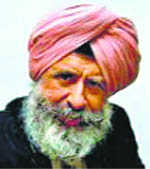
Professor Ajit Singh (1940-2015)
Sucha Singh Gill
WITH the passing away of Dr Ajit Singh, Professor Emeritus of Economics at Cambridge University, UK and Dr Manmohan Singh Chair Professor in Economics at Panjab University, Chandigarh on June 23, this year, the fraternity of economists has lost an intellectual of international fame. Punjab has lost its great son. He was born at Lahore, the pre-Partition capital of Punjab and passed his graduation from Panjab University, Chandigarh in 1958. He had his ancestral house at Chandigarh and was a regular visitor to the city throughout his life. Along with Panjab University, he had a long association with CRRID, Chandigarh, in its faculty interactive sessions.
After graduation, he went to the US for a Master's degree in economics at Howard University, Washington DC, and did PhD from University of California, Berkeley. He started his teaching and research career at Cambridge University in 1965, from where he became life Fellow at Queens' College and retired as Professor of economics in 2007. On superannuation, he was made Professor Emeritus and also appointed Director, Research, at the Cambridge Endowment of Research in Finance, a programme of Centre for Development Studies, Cambridge University. In recognition of his contribution to research, he was invited as Chair Professor at University of Birmingham in 2007-08; Tun Ismail Chair Professor at University of Malaysia in 2011 and Dr Manmohan Singh Chair Professor at Panjab University, Chandigarh in 2012. Earlier, he worked as Senior Economic Advisor for UN Development Agencies such as International Labour Organisation (ILO), United Nations Conference on Trade and Development (UNCTAD), United Nations Industrial Development Organisation (UNIDO), the World Bank and International Financial Corporation (IFC).
Professor Singh was the recipient of a large number of awards and honours including doctorate honoris causa from several institutions. He was elected as academician of the UK Academy of Social Sciences (2004); inducted into the Hall of Fame, Department of Economics, Howard University, Washington DC and was bestowed Glory of India Award for Individual excellence, excellent performance and outstanding contribution for the progress of the nation and worldwide. He was the author of 17 books and monographs and 200 research papers, nearly half of them in the peer-reviewed journals of international standards such as Economic Journal, Journal of Economic Literature, Review of Economic Studies and European Economic Review. His non-journal papers had been published in the volumes edited by outstanding economists, including Nobel Laureates like Amartya Sen, Joseph Stiglitz and Oliver Williamson. He was the Founder-Editor of Cambridge Journal of Economics and remained on its advisory board till the end.
Professor Singh has been known to produce quality research work and supervise quality doctoral thesis. His research work was integrated with top-class teaching. He lectured extensively on modern business enterprises, corporate organisation and the theory of the firm, the rise and fall of the golden age in advanced economies, developing countries and in the world economy, corporate governance and corporate finance. The focus of his research work can be divided into three categories. The three categories are advanced countries; developing countries; and public policy and public service.
His work on advanced countries was done during the early phase of his academic life during the 1970s and the 1980s. This included causes and effects of mergers in advanced industrial economies (1977-80); structural change in the UK economy and in the global restructuring of Industry (1978-92); world macroeconomic and North-South issues; and globalisation of financial markets and its implications.
The work on developing countries got greater attention of Professor Singh especially after the 1980s, when he worked with UN development agencies and the World Bank. The major issues of research in this phase include establishment of stock markets in centrally planned and semi-industrial economies; comparative performance of public and private sector manufacturing enterprises. He also researched comparative economic development in East Asia and Latin America; competition and competition policy in emerging markets (1990-2003); urbanisation, industrial development and the large metropolis in the Third World; employment and unemployment in the North and South; structural adjustment and economic and industrial policy in developing countries (1986-93); pension reforms and pension policies in developing and developed countries and liberalisation, globalisation and implications for the South. Lastly, professor Singh remained very active throughout his career in the area of public policy and public service, especially related to development of the poor countries.
He was very concerned with North-South interactions for improved mutual benefit for rich and the poor countries. This work included advocacy, policy advice and interactions with ministers, officials, civil society in developing countries and senior civil servants from international organisations. In this context, his association with former Prime Minister Dr Manmohan Singh for a long period, especially after he became the Finance Minister in 1991 has been important for India.
A large part of the research done by Professor Singh falls in the category of industrial and development economics with an empirical base and which has policy implications. His research will continue to guide policy in the developing countries in the coming years. He was a votary of the state playing a greater role in the economy in the era of a globalised world. This provides a clue to policy shift to face the impending danger of global recession of the variety of 1930s.
The writer is Professor of South Asia, Centre for Research in Rural & Industrial Development, Chandigarh



























